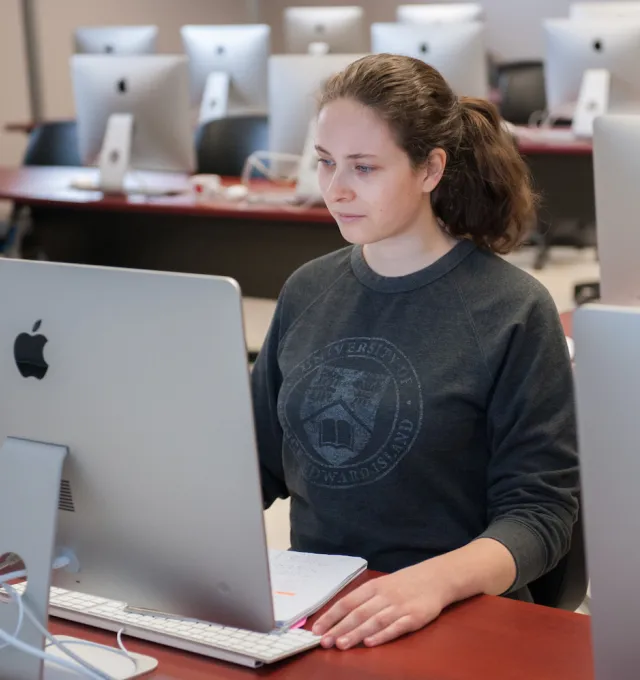Computer Science programs enable innovation and discovery in most fields. Computer science encompasses both theory and practice; theoretical ideas about how information is represented and processed, and practical techniques for creating new software. UPEI offers computer science degree options including honours, major, minor, specialization in video game programming, and co-operative education.
Mathematical and computational sciences are experiencing a “boom”. Everyone is collecting data, and they need people with the skills to manage, analyze, and extract useful information from the data. This is what mathematicians, statisticians, and computer scientists are trained to do.
Employment prospects are among the highest of any field, and Honours graduates are well positioned to pursue graduate studies.
Meet Chris Vessey, UPEI sessional and laboratory instructor


Chris Vessey is a Systems Administrator, Laboratory Instructor, and a Sessional Instructor in the School of Mathematical and Computational Sciences at UPEI. Older than dirt itself, he’s been around UPEI in a teaching capacity since 2000, but also had a stint from 1990 to 1995 as a User Services Support Technician in what is now called ITSS.
Need more information about Computer Science?
The personal information requested on this form is collected under Section 31(c) of the PEI Freedom of Information and Protection of Privacy Act. Read our Disclaimer.
Note: Current UPEI students should refer to Student Planning in myUPEI and the UPEI Academic Calendar governing their entry year, and speak to an academic advisor about course requirements. The course structure presented for this program is a recommended, unofficial progression for prospective students.
Note: As per Academic Regulation 1h, all undergraduate degree programs require successful completion of IKE-1040 and a Writing Intensive Course.
Common Core
All degree programs in the School of Mathematical and Computational Sciences are built on a common core of courses that should be completed in the first two years of study. This common core consists of the following courses:
| Course | Course name | Credits |
|---|---|---|
| MATH 1910 | Single Variable Calculus I | 4 |
| MATH 1920 | Single Variable Calculus II | 4 |
| MATH 2610 | Linear Algebra I | 3 |
| STAT 1910 | Introduction to Statistics | 3 |
| CS 1910 | Computer Science I | 3 |
| ENG 1010 | Academic Writing | 3 |
| IKE 1040 | Indigenous Teachings of Turtle Island | 3 |
| Total Semester Hours of Credit | 23 |
Common Breadth Requirement
Students must take at least 15 semester hours of credit beyond the core course requirement in courses outside the School of Mathematical and Computational Sciences, and of these 15 semester hours of credit at least 6 must be from outside the Faculty of Science.
Common Advanced Courses
Students in all degree programs in the School of Mathematical and Computational Sciences must complete MCS 4210 Professional Communication and Practice (writing-intensive) and MCS 3050 Tutoring in Mathematical and Computational Sciences.


Note: Current UPEI students should refer to Student Planning in myUPEI and the UPEI Academic Calendar governing their entry year, and speak to an academic advisor about course requirements. The course structure presented for this program is a recommended, unofficial progression for prospective students.
The Honours in Computer Science requires a total of 126 semester hours of credit, as described below.
| Credits | |
| The Common Core | 23 |
| CS 1920 - Computer Science II | 3 |
| CS 2520 - Computer Organization and Architecture | 3 |
| CS 2620 - Comparative Programming Languages | 3 |
| CS 2910 - Computer Science III | 3 |
| CS 2920 - Data Structures and Algorithms | 3 |
| CS 2820 - Programming Practices | 3 |
| MATH 2420 - Combinatorics I | 3 |
| MATH 2910 - Multivariable Calculus | 4 |
| MCS 3320 - Theory of Computing | 3 |
| CS 3420 - Computer Communications | 3 |
| CS 3520 - Operating Systems | 3 |
| CS 3610 - Analysis and Design of Algorithms | 3 |
| CS 3620 - Software Design and Architecture | 3 |
| CS 3710 - Database Systems | 3 |
| At least one of: CS 4110 - Artificial Intelligence and Automated Reasoning OR CS 4120 - Machine Learning | 3 |
| CS 4810 - Software Engineering | 3 |
| MCS 4901 - Honours Research Project I: Research | 3 |
| MCS 4902 - Honours Research Project II: Thesis | 3 |
| Three electives in the Mathematical and Computational Sciences (at the 2000 level or higher) | 9 |
| MCS 3050 - Tutoring in Mathematical and Computational Sciences | 1 |
| MCS 4210 - Professional Communication and Practice | 3 |
| Additional general electives | 32 |
| Total Semester Hours of Credit | 126 |
The Major in Computer Science requires a total of 120 semester hours of credit, as described below.
| Credits | |
| The Common Core | 23 |
| CS 1920 - Computer Science II | 3 |
| CS 2520 - Computer Organization and Architecture | 3 |
| CS 2620 - Comparative Programming Languages | 3 |
| CS 2910 - Computer Science III | 3 |
| CS 2920 - Data Structures and Algorithms | 3 |
| CS 2820 - Programming Practices | 3 |
| MATH 2420 - Combinatorics I | 3 |
| MCS 3320 - Theory of Computing | 3 |
| CS 3420 - Computer Communications | 3 |
| CS 3520 - Operating Systems | 3 |
| CS 3610 - Analysis and Design of Algorithms | 3 |
| CS 3620 - Software Design and Architecture | 3 |
| CS 3710 - Database Systems | 3 |
| CS 4810 - Software Engineering | 3 |
| CS 4820 - Software Systems Development Project | 3 |
| One elective in Mathematical and Computational Sciences (at the 2000 level or higher) | 3 |
| MCS 3050 - Tutoring in Mathematical and Computational Sciences | 1 |
| MCS 4210 - Professional Communication and Practice | 3 |
| Additional general electives: | 45 |
| Total Semester Hours of Credit | 120 |
The Major in Computer Science with a specialization in Video Game Programming requires a total of 120 semester hours of credit, as described below.
| Credits | |
| The Common Core | 23 |
| CS 1920 - Computer Science II | 3 |
| CS 3130 - Mobile Device Development – Android | 3 |
| CS 2520 - Computer Organization and Architecture | 3 |
| CS 2910 - Computer Science III | 3 |
| CS 2920 - Data Structures and Algorithms | 3 |
| CS 2620 - Comparative Programming Languages | 3 |
| CS 2820 - Programming Practices | 3 |
| MATH 2420 - Combinatorics I | 3 |
| MCS 2050 - C++ Technology Lab | 1 |
| CS 3110 - Video Game Design | 3 |
| MCS 3320 - Theory of Computing | 3 |
| CS 3420 - Computer Communications | 3 |
| CS 3520 - Operating Systems | 3 |
| CS 3610 - Analysis and Design of Algorithms | 3 |
| CS 3620 - Software Design and Architecture | 3 |
| CS 3710 - Database Systems | 3 |
| CS 4350 - Computer Graphics Programming | 3 |
| CS 4360 - Advanced Computer Graphics Programming | 3 |
| At least two of: CS 4060 - Cloud Computing CS 4120 - Machine Learning CS 4440 - Data Science OR CS 4610 - Wireless Sensor Networks | 6 |
| CS 4650 - Video Game Architecture | 3 |
| CS 4810 - Software Engineering | 3 |
| CS 4830 - Video Game Programming Project | 6 |
| One elective in the Mathematical and Computational Sciences (at the 2000 level or higher) | 3 |
| MCS 3050 - Tutoring in Mathematical and Computational Sciences | 1 |
| MCS 4210 - Professional Communication and Practice | 3 |
| Additional general electives | 20 |
| Total Semester Hours of Credit | 120 |
Students may obtain a Minor in Computer Science by completing at least 21 semester hours of credit in Computer Science defined as follows:
| CS 1910-1920 - Computer Science I & II | 6 |
| CS 2520 - Computer Organization and Architecture | 3 |
| CS 2920 - Data Structures and Algorithms | 3 |
| plus 3 semester hours of credit in Computer Science at the 3000 level or higher, and an additional 6 semester hours of credit in Computer Science at the 2000 level or higher | 9 |
| Total Semester Hours of Credit | 21 |

The UPEI Co-op Program is an integrated approach to university education which enables students to alternate academic terms on campus with work terms in suitable employment. The success of such programs is founded on the principle that students are able to apply theoretical knowledge from course studies in the workplace and return to the classroom with practical workplace experience. Students who successfully complete all the requirements of the program will have the notation entered on their transcripts and on the graduation parchment.
Students accepted into the program complete at least three paid work terms of normally 14 weeks duration, and three professional development courses. Credits earned through completion of work terms are counted as general electives.
The Co-op option is available to full-time students in any MCS Major or Honours program. Applications to the Co-op Education Program are normally made after completion of the first year of study. MCS students must complete 126 semester hours of credit in order to graduate with the Co-op designation.
Visit the Co-operative Education Program website for more information.
High School Graduates
Canadian High School Equivalency Chart
- Grade 12 Academic English
- Grade 12 Academic Mathematics
- Two Grade 12 Academic Science subjects (acceptable subjects: Chemistry, Biology, Physics, Computer Science, Oceanography, Animal Science, Environmental Science)
- One additional Grade 12 Academic course
Please note: Successful completion of Grade 12 Chemistry (or equivalent) is required as a prerequisite for permission to register in CHEM-1110.
Please refer to the UPEI Academic Calendar for complete admissions information.
UPEI's undergraduate tuition is the second-lowest in the Atlantic region, and we offer millions of dollars in scholarships and awards.
Tuition
$7,630 per year, based on 30 credit hours ($763 per 3 credit course).
International students pay $9,040 per year in addition to full-time student tuition.
For a complete breakdown of part-time or full-time study as a student in the Faculty of Science, visit our Tuition and Fees page.
Scholarships and Awards
UPEI supports you and your educational goals. We administer millions of dollars in scholarships and awards to our undergraduate and graduate students every year. Depending on your faculty or program, and year of study, you may be eligible for available awards.
Search the complete list of scholarships for information and application forms.
Celebrating Student Achievement
Including Guaranteed Entrance Scholarships and Academic Excellence Awards, these awards recognize the academic achievements of all students who meet the eligibility criteria while studying towards their first undergraduate degree.
Visit the Scholarships site for complete information.
UPEI's interesting and unique programs are enhanced by our caring and supporting faculty, instructors, and staff.
School of Mathematical and Computational Sciences faculty and staff
